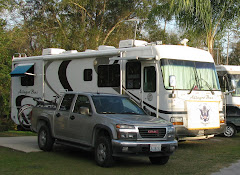Early Tuesday
morning, 02JUN, we awoke to more elk outside the RV; this time young bucks. After breaking camp, we filled up the RV
w/diesel, & headed to Grande Prairie, AB.
We took the scenic Big Horn Highway (AB highway 40), with a stop at the
Grande Cache, AB, Interpretive Centre.
It was a very nice Visitor Center with an interesting outdoor display of
different fire towers & forestry cabins used over the decades.
We arrived in Grand
Prairie, AB, set up camp, & headed to the Visitor Centre. At the Centre we discovered that the free
buffalo barbeque on Wednesday for visitors no longer occurs; but there is a free
bus tour of town & surrounding area at 7PM sponsored by The Rotary. Corrie decided to skip the tour, so after
dinner Dan headed back to the Centre & the Rotary tour. Dan won the prize for furthest visitor from
out of town (Dan was the only person on the tour!).
Wednesday morning we
headed back to Visitor Center to view the Heritage Discovery Centre in the
basement. This is a small but rather new
museum w/interactive exhibits.
We then
drove to Muskuseepi Park to see the other half of Grande Prairie Museum. This facility is the original museum &
the displays are the traditional static type, with no interactivity. Although not as interesting as the new
facility, it does have an outdoor display of original “settler” buildings.
Some of the
interesting things we learned between the two facilities:
>the actual
settling/homesteading of northern & central Alberta occurred fairly
recently, 1910-1930; & the majority of settlers were Canadian & USA
farmers looking for better land to homestead and/or escape the Depression
>there was a 1941
film about life in Grande Prairie & you would have thought it was filmed at
the turn of the century – land was cleared by ax; cabins were one room &
built by hand; farming was done by hand & draft horses; the railroad had
only arrived in the 30s; there were many one room schools throughout the area,
not because there were few kids, but because kids had to walk to school &
the school had to be close to each group of kids
>up to the 1930s
many homesteaders traveled to their new homesteads in what were called
“cabooses” - wooden wagons w/canvas covers, on wheels in the summer or sleigh
runners in the winter; these cabooses often served as their only shelter for
the first year
>the local
populations of the Yukon Territory, & northern parts of British Columbia
& Alberta, were outnumbered by US Army personnel (sometimes ten to one) sent
to build the AlCan Highway, the Canol Pipeline, & airfields to ferry tens
of thousands of aircraft to Russia, during WWII
>the history of
the Sudeten refugees, which no country would accept until Canada said yes


















2 comments:
Loved the part about Dan winning the prize!
thanks, glad it brought you a smile. - corrie & dan
Post a Comment